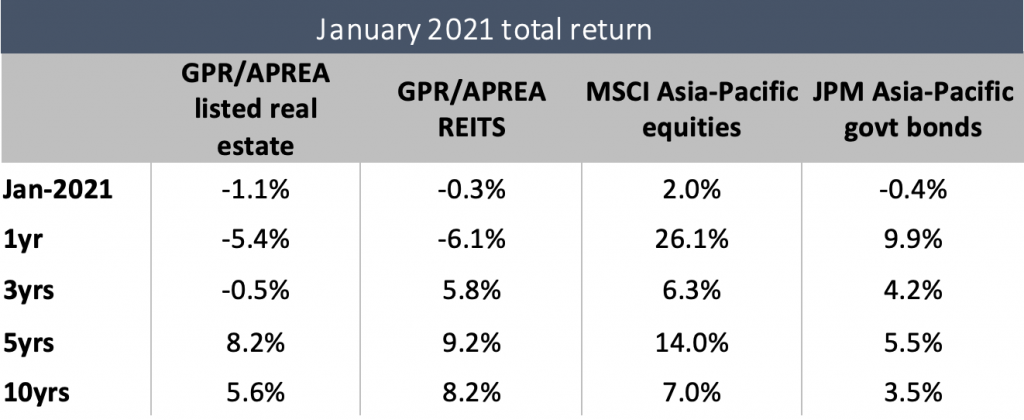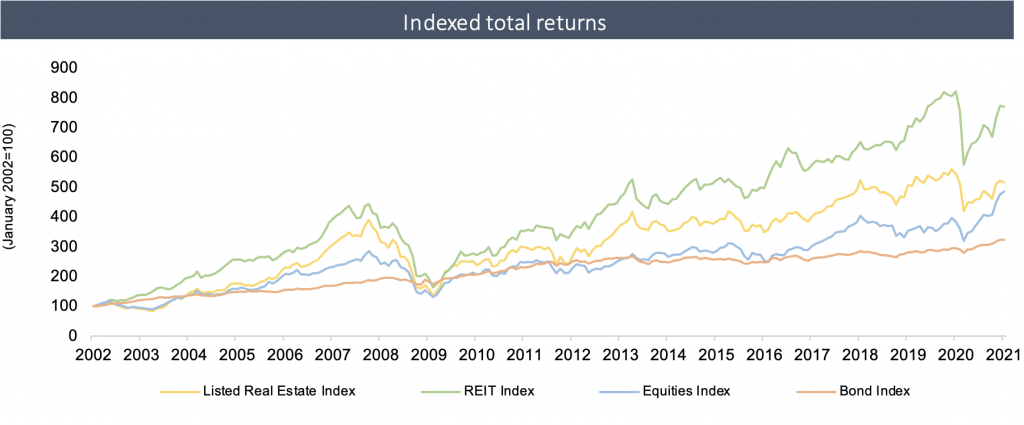Global capital markets rallied at the beginning of the year, riding on expectations of a global economic recovery; investors also cheered the swearing-in of US president Joe Biden and the implications of anticipated policy reversals that could arise from the new administration. However, financial markets faltered towards the end of January, ending with a mixed performance as new coronavirus variants and delays to vaccinations prompted caution. Real estate stocks in the region failed to hold on to the rally that started in November last year. However, Japan- and Singapore-listed counters managed to buck the overall trend.
Listed real estate
The GPR/APREA Listed Real Estate Composite fell at the start of the new year, underperforming both the region’s equity and its REIT markets. The declines were seen across the region’s bourses, with those in the emerging markets hit particularly hard. Rising infection caseloads threw recovery prospects in doubt as stocks across the major markets in emerging South-east Asia came under pressure with governments reverting to stricter measures. In Hong Kong, authorities also imposed the city’s first lockdown to battle another wave of infection. Meanwhile, investors became wary after monetary officials in China unexpectedly slowed liquidity injections, signalling a tightening bias as the country’s recovery from the pandemic gains firmer footing.
REITs
Asia-Pacific REITs declined in the opening month of 2021 with a marginal 0.3% loss, dragged lower by Australian REITs which fell 4% in January. However, those in Japan and Singapore bucked the regional trend to post increases on the strength of its office and industrial listings. Office S-REITs reportedly remain well poised to capture regional expansion by Chinese tech giants with the likes of Lazada and its parent company, Alibaba, as well as ByteDance, which owns TikTok, expanding its office footprint on the island.
Brookfield India Real Estate Trust, backed by Canadian asset manager Brookfield Asset Management Inc., is seeking to raise as much as US$522m in an Indian IPO, which is slated for a February debut. Brookfield’s REIT is the third REIT launched in under two years, as acceptance of the investment product gains momentum in the country. India has been seeking to attract more REIT IPOs in recent years by tweaking rules to make the vehicle more attractive for investors and developers.
Blackstone is also believed to be floating its logistics portfolio on the Australian stock exchange, according to newspaper articles. With a 45-asset portfolio across major Australian cities, the newly created Milestone Logistics is expected to raise more than A$1bn if the IPO is pursued.
Outlook
Asia-Pacific REITs could be set for a broader recovery this year, with the continued global economic recovery and low-interest-rate environment a positive for the asset class. However, the pace will remain uneven across sectors. Riding on long-term structural trends, Industrial REITs have emerged as safe haven assets in a pandemic-ravaged year. This is likely to persist as the increasing prevalence of mutated covid-19 virus strains could refuel demand in the sector, which we note has outperformed at the height of the pandemic. The fortunes of office REITs will be bifurcated along geographies; those with exposure to the region’s tech hubs are likely to outperform. While recovery in hospitality and retail is likely to be more nuanced, vaccine optimism has fueled confidence and likely beneficiaries from a rotation to cyclical stocks. The uncertain course of the pandemic and the trajectory of the global economic recovery, in the meantime, is likely to induce more volatility in the short term and remain a huge sentiment driver. However, with continued progress in the development and more visibility on the horizon in the deployment of vaccines, there are reasons to believe that risks in 2021 are weighted on the upside.










